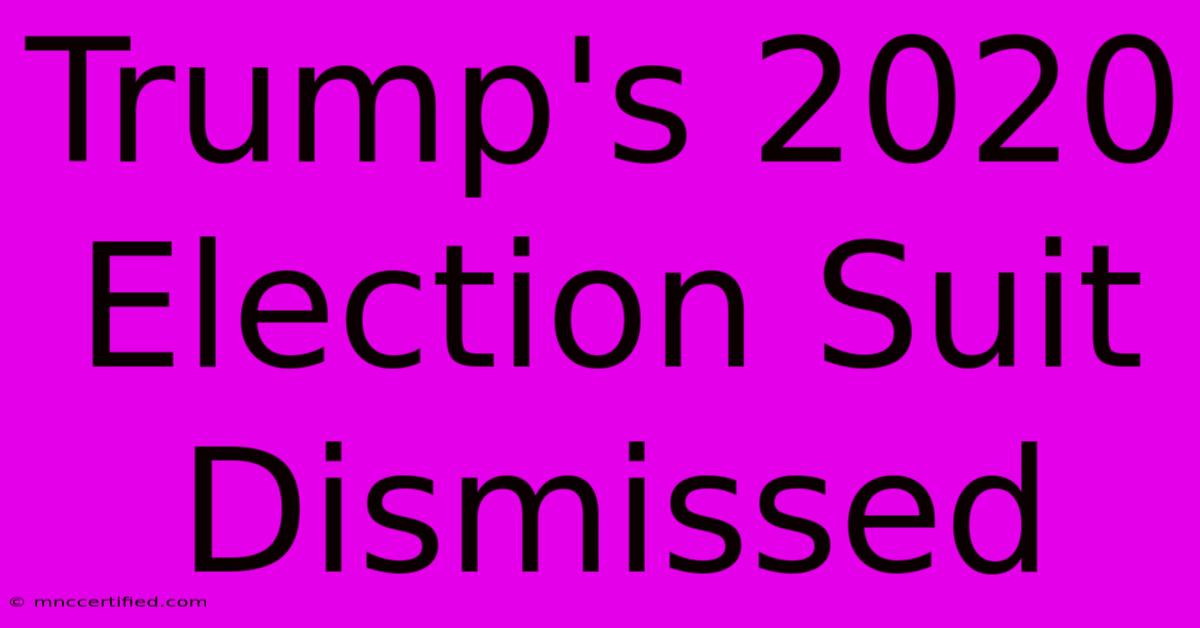Trump's 2020 Election Suit Dismissed

Table of Contents
Trump's 2020 Election Suit Dismissed: A Comprehensive Overview
The 2020 United States presidential election was followed by numerous legal challenges from the Trump campaign, alleging widespread voter fraud. These lawsuits, filed in various states, ultimately failed to overturn the results, culminating in the dismissal of numerous cases. This article provides a comprehensive overview of these dismissed lawsuits, focusing on key arguments, legal outcomes, and their broader implications.
The Key Allegations of Voter Fraud
The core allegations in Trump's election lawsuits centered around claims of widespread voter fraud, encompassing various alleged irregularities:
- Dominion Voting Machines: Conspiracy theories alleging that Dominion voting machines were manipulated to switch votes from Trump to Biden were central to many lawsuits. These claims were repeatedly debunked by election officials and independent audits.
- Mail-in Ballots: The surge in mail-in ballots due to the COVID-19 pandemic fueled accusations of fraudulent ballots, including allegations of illegal harvesting and counting of illegitimate ballots. These claims lacked substantial evidence.
- Statistical Anomalies: Some lawsuits pointed to statistical anomalies in vote counts as evidence of fraud. However, these claims often failed to account for normal variations in election results across different demographics and geographic locations.
Lack of Evidence and Judicial Rejections
Crucially, the Trump campaign struggled to provide credible evidence to support these allegations in court. Judges across the political spectrum, including those appointed by Republican presidents, repeatedly dismissed these lawsuits. Their rulings highlighted the lack of substantial evidence and the failure to meet the legal standards required to overturn election results. Judges frequently cited the absence of credible witnesses, verifiable documentation, and the lack of any demonstrable impact on the overall election outcome.
Significant Dismissed Lawsuits
Several key lawsuits exemplify the pattern of dismissal:
- Pennsylvania: Lawsuits challenging Pennsylvania's election results were dismissed due to a lack of evidence of widespread fraud. The courts emphasized the procedural irregularities in the lawsuits and the absence of any credible evidence of voter manipulation.
- Georgia: Similar challenges in Georgia faced dismissal after recounts and audits confirmed Biden's victory. Claims of irregularities were thoroughly investigated and found to be unsubstantiated.
- Michigan: Lawsuits attempting to overturn Michigan's results were rejected, with judges citing the lack of credible evidence and procedural deficiencies in the legal filings.
These are just a few examples; numerous other lawsuits across various states suffered similar fates. The consistent rejection across multiple jurisdictions highlighted the lack of merit in the legal challenges.
Implications and Aftermath
The dismissal of these lawsuits had several significant implications:
- Confirmation of Election Results: The dismissals solidified the legitimacy of Joe Biden's victory, reinforcing the integrity of the electoral process despite the persistent challenges.
- Erosion of Public Trust: While the lawsuits failed to overturn the election, they contributed to the spread of misinformation and fueled distrust in democratic institutions among a segment of the population.
- Impact on Future Elections: The legal precedents set by the dismissal of these lawsuits are likely to influence future election challenges, raising the bar for credible allegations of voter fraud.
The 2020 election lawsuits serve as a stark reminder of the importance of evidence-based legal challenges and the robustness of the US judicial system in upholding the rule of law. While the claims of widespread voter fraud were ultimately debunked, the impact of these lawsuits on public discourse and trust in democratic institutions remains a significant concern. The lack of evidence and the overwhelming rejections underscore the importance of factual accuracy and the critical role of the judiciary in maintaining the integrity of elections.

Thank you for visiting our website wich cover about Trump's 2020 Election Suit Dismissed. We hope the information provided has been useful to you. Feel free to contact us if you have any questions or need further assistance. See you next time and dont miss to bookmark.
Featured Posts
-
Rhea County Insurance Dayton Tn
Nov 26, 2024
-
Lauren Laverne All Clear After Cancer
Nov 26, 2024
-
Positive Cancer Update Lauren Laverne
Nov 26, 2024
-
Menendez Brothers Joint Court Hearing
Nov 26, 2024
-
Police Investigate Devastating Tractor Wave
Nov 26, 2024